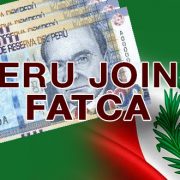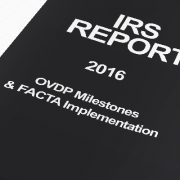This May Be Your One Last Opportunity to Avoid Criminal Prosecution and Increased Civil Penalties!
Since July 1, 2014, the most feared U.S. legislation regarding international tax enforcement – Foreign Account Tax Compliance Act (“FATCA”) – is being implemented by most banks around the world. As part of this compliance, foreign banks from around the world are sending letters to account holders that they believe have, or had, a U.S. tax nexus (or other U.S. connection) requesting information to determine whether such account holders have disclosed their foreign bank accounts to the IRS. The letters from foreign banks generally require an account holder to disclose whether the account has been declared to the IRS through the filing of a Report of Foreign Bank and Financial Accounts (commonly known as the “FBAR”) form and/or a Form 1040 personal income tax return, participation in the various IRS Offshore Voluntary Disclosure Programs, or otherwise. Sometimes foreign banks request that the account holder submit an IRS Form W-9 or W-8BEN, which is generally required to be completed by U.S. account holders for tax reporting purposes.
What Is FATCA?
FATCA was signed into law in 2010 and codified in Sections 1471 through 1474 of the Internal Revenue Code. The law was enacted in order to reduce offshore tax evasion by U.S. persons with undisclosed offshore accounts. There are two parts to FATCA – U.S. taxpayer reporting of foreign assets and income on Form 8938 and reporting by a Foreign Financial Institution (“FFI”) of foreign bank and financial accounts to the IRS. It is the latter that is resulting in FFI’s sending out that dreaded letter to suspected U.S. account holders requesting U.S. taxpayer identification and information (referred hereafter as the “FATCA letter”).
FATCA generally requires an FFI to identify certain U.S. accountholders and report their accounts to the IRS. Such reporting is done either through an FFI Agreement directly to the IRS or through a set of local laws that implement FATCA.
If an FFI refuses to do so or otherwise does not satisfy these requirements (and is not otherwise exempt), U.S.-source payments made to the FFI may be subject to withholding under FATCA at a rate of 30%. Note that FATCA information reporting and withholding requirements generally do not apply to FFI’s that are treated as “deemed-compliant” because they present a relatively low risk of being used for tax evasion or are otherwise exempt from FATCA withholding.
Seven Deadly Myths.
As foreign banks march inexorably towards the implementation of FATCA, there are still many people who subscribe to any one or all of the seven deadly myths that could find themselves facing potentially crippling circumstances after July 1, 2014. For safety’s sake, we get down to brass tacks and present the facts below – in plain language – to debunk these myths.
Myth 1: No action required now.
This is false. As of July 1, 2014 all FFI’s must have implemented a FATCA Compliance Program to comply with its country’s Intergovernmental Agreement (“IGA”) with the United States. FFI’s must self-certify their FATCA status [Chapter 4 of the U.S. Internal Revenue Code] to their withholding agents by either providing a Global Intermediary Identification Number (GIIN) or new IRS Form W-8BEN-E/W-8IMY prior to this date.
Myth 2: Best to “wait and see” for a foreign country’s enabling legislation.
This is false. Wishing this to be the case does not make this so. To be clear, registration and reporting are distinct functions under FATCA. All FATCA registration is directly with the IRS and is occurring now.
Registration with the IRS is free of cost and mandatory for any FFI to become registered deemed-compliant under its country’s IGA. Only the IRS has the power to register a FFI and issue a GIIN. Enabling legislation by the foreign country is irrelevant to FATCA registration for FFI’s as no foreign country revenue authority has – or will ever have – the power to register a FFI and issue a GIIN. Again, we emphasize, this must be done directly with and by the IRS.
The truth is, a foreign country’s enabling legislation is simply intended to provide the legal framework for compliance with, not avoidance of FATCA (and other automatic tax information exchange agreements), and the development of the regulatory framework for operating the agreement.
Myth 3: IRS registration may breach confidentiality.
This is false. Withholding agents already require W-8s from all FFI’s to avoid withholding liability. This is a long-established practice and the Form W-8 has simply now been revised to include FATCA status. A FFI must self-certify, under penalty of perjury, its FATCA status to withholding agents using the new W-8 before July 1, 2014. To obtain a GIIN, a FFI must file Form 8957 via the IRS Foreign Financial Institution Registration System (FRS) (or manually). Once the GIIN is obtained, it can be verified by withholding agents via FRS or submitted via Form W-8. There are no material differences between the information disclosed, or commitments made, under Form W-8 and Form 8957. Both forms are complementary and require basic identifying information about the FFI. Specific investor information is never disclosed.
Myth 4: Certain foreign investment funds may be exempted as sponsored entities.
This is false. Sponsored entity exemption would require all the sponsored FFI’s of the sponsor to use a single GIIN. If any FFI using the sponsored GIIN becomes FATCA non-compliant – for any reason – all FFI’s using the same GIIN would also become non-compliant.
Myth 5: Model 1 or Model 2 IGA’s displace U.S. Treasury Regulations.
This is false. They both work in tandem. A FFI is treated as FATCA-compliant, and not subject to FATCA withholding tax, to the extent it complies with its obligations under the IGA. The U.S. Treasury regulations are incorporated by reference into the IGA. Under the IGA, the foreign country is bound to use U.S. Treasury definitions to the extent those definitions are not defined by the IGA, and importantly, the foreign country is not permitted to use any other definition in local legislation that would “frustrate the purposes” of the IGA.
Myth 6: There is no person charged with the responsibility that a foreign bank complies with the IGA.
This is false. Under the IGA a FATCA Responsible Officer (FRO) must be appointed who is (a) as an officer of the registered deemed-compliant FFI with sufficient authority to ensure that the FFI meets the applicable registration requirements and (b) who certifies that the FFI will comply with its continuing FATCA obligations.
Myth 7: There is no incentive for FRO’s to ensure a foreign bank’s compliance under an IGA.
This is false. FRO’s have serious compliance responsibilities under FATCA. In fact, FATCA compliance revolves around the FRO, like Sarbanes Oxley compliance revolves around the CFO. Especially in the context of a FFI that does not typically have any staff, the role is even more essential. It’s a fallacy and wishful thinking that FROs can be lax or “lite” under the IGA. The IRS has consistently expressed its expectations that FRO’s deliver robust FATCA compliance and high-quality FATCA information from either procedure. Whoever says otherwise has not been paying attention and we all know how this story ended for Switzerland. Key considerations for a FRO under the IGA include:
- Willfully submitting any fraudulent or materially false document to the IRS is a Federal offence. [IRC §§7206(2) & 7207]
- FFI’s self-certification as a Reporting Financial Institution to withholding agents will entail signing the IRS Form W-8 under penalties of perjury.
The Truth About FATCA.
Whether out of lack of knowledge, preparedness or self-interest, those who are propagating these myths are not doing themselves or their U.S. clients any favors. As of July 1, 2014, FATCA went into full effect, which means that FFI’s now have to report the required FATCA information to the IRS. Many FFI’s are making a full effort to comply with FATCA. As part of this effort, FFI’s around the world have been sending out “FATCA letters”. A FATCA letter is basically a letter from your bank or other financial institution which introduces FATCA to their customers and asks them to provide answers to a various set of questions aiming to find out information specific to FATCA compliance. Often, instead of asking all of these questions directly a FATCA letter would simply list out a series of forms that contain these questions such as IRS Forms W-9 and W-8BEN.
The information furnished by the customer to the bank would then be used by the bank to report information on the customer’s foreign accounts to the IRS. If the customer refuses to answer the questions or provide the necessary forms, the financial institution would often close the account and report it as a “recalcitrant account” to the IRS. Once that is done, the government will look to see if your account ever had in excess of a $10,000 balance. If it did and you did not report it on an FBAR or on your federal income taxes, the case will likely be referred to the IRS Criminal Investigation Division. At that point, the government will begin to build a case against you. A U.S. citizen can be sentenced up to five years in prison for each year that they willfully failed to file an FBAR and can be penalized up to 50% of the balance of the foreign account for each year that they willfully failed to report (up to 250% of the account’s balance). The civil penalties alone can easily reach double the amount of the balance of the account in question.
Why You Should Do Something About It Before It’s Too Late
Until the government receives your name and account information and chooses to act on that information, you have the opportunity to avoid the possibility of time in a federal prison and reduce the potential civil penalties for failing to report your foreign account. If you have never reported your foreign investments on your U.S. Tax Returns or even if you have already quietly disclosed, you should seriously consider participating in the IRS’s 2014 Offshore Voluntary Disclosure Program (“OVDP”). Once the IRS contacts you, you cannot get into this program and would be subject to the maximum penalties (civil and criminal) under the tax law. Taxpayers who hire an experienced tax attorney in Offshore Account Voluntary Disclosures should result in avoiding any pitfalls and gaining the maximum benefits conferred by this program.
Protect yourself from excessive fines and possible jail time. Let the tax attorneys of the Law Offices Of Jeffrey B. Kahn, P.C. located in Los Angeles, San Francisco, San Diego and elsewhere in California qualify you for OVDP.
Description: Let the tax attorneys of the Law Offices Of Jeffrey B. Kahn, P.C. resolve your IRS tax problems, get you in compliance with your FBAR filing obligations, and minimize the chance of any criminal investigation or imposition of civil penalties.




 Follow
Follow Follow
Follow